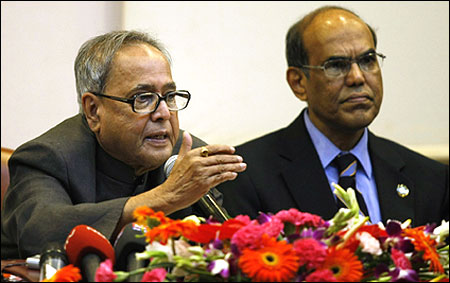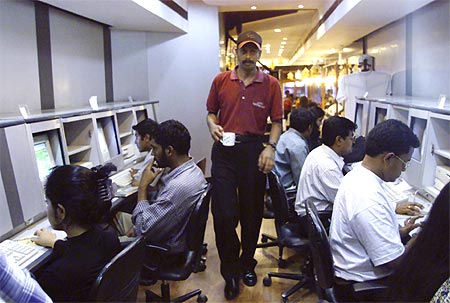 | « Back to article | Print this article |
Why senior MNC execs are jumping ships
They are calling Vishwavir Ahuja the pied piper of Ratnakar Bank.
Ever since he took the top job at the sleepy Kohlapur-based rural bank to morph it into a major financial institution, in 2010, seasoned professionals from foreign banks are following him to pursue an inclusive growth agenda.
After Rajeev Ahuja, Nitin Chopra and Sunil Gulati, the latest to come on board is Joginder Singh Rana, a Citibanker for 22 years, as the chief operations officer.
Click Here For Rediff Realtime News!
Click NEXT to read further. . .Why senior MNC execs are jumping ships
He would join the recent appointees, R Gurumurthy, head of corporate & institutional banking, from Standard Chartered Bank and head of human resources Tajinder Kumar, formerly with Deutsche Bank Singapore.
"I am truly delighted," says Ahuja, MD & CEO of Ratnakar Bank, also a former CEO of Bank of America in India.
A Sunil Mittal or an Anand Mahidra or a Mukesh Ambani is known to inspire senior executives, wooing them away from MNCs to their own transnational conglomerates.
Click NEXT to read further. . .
Why senior MNC execs are jumping ships
Mittal recently did exactly that with Gopal Vittal, not once but twice over.
This will be Vittal's second stint at Bharti Airtel, where he served as marketing director for about two years starting 2006, before moving to rejoin Hindustan Unilever's board as executive director of the home and personal care division, the largest division of the Anglo-Dutch major in India.
His portfolio contributes three-fourths of the company's top line. Many, therefore, saw him as an obvious successor to Nitin Paranjpe, who has been the MD & CEO since April 2008.
Click NEXT to read further. . .
Why senior MNC execs are jumping ships
Naturally, his decision to return to Bharti to pursue a more entrepreneurial assignment -- he joins from April as a special director (special projects), spearheading international business strategy and to build its data business -- instead of a well-oiled, global process-driven set-up got many nonplussed.
But, Vivek Lall understands that itch perfectly well.
It took just one 'invigorating meeting with Mukesh Ambani', to 'inspire' a reticent Lall to jump ship from Boeing, where he was leading the strategic defence, space and security business to head a Reliance start-up.
Click NEXT to read further. . .
Why senior MNC execs are jumping ships
As the president and CEO for new ventures, at Reliance, Lall is fronting Ambani's tryst with homeland security and defence that may even culminate in separate strategic JVs with Dassault Aviation and Siemens.
"The lustre of MNCs has gone. Very few want to be with them forever. Do you hear of GE, Citibank lifers anymore," asks R Suresh, MD of the Mumbai-based executive search firm Stanton Chase.
Most MNCs, says Suresh, have gone back to being either matrix-driven or being controlled from overseas or even by an expat.
Click NEXT to read further. . .
Why senior MNC execs are jumping ships
Parallely, the arrival of Indian multinational conglomerates like Essar, Bharti and Birlas, among others, has also led to a considerable sway of talent from MNCs.
These flag bearers of India Inc have grown in scale, size and the complexity of their compensation has also gone up considerably, making them attractive for senior managers like Vittal or Lall.
The coveted MNC jobs or global assignments are not necessarily a pull factor anymore and HR specialists will agree that Indian talent across sectors is increasingly finding an affinity for Indian business houses.
Click NEXT to read further. . .
Why senior MNC execs are jumping ships
But, this is the third phase of reverse-migration.
Unlike the past two rounds, experts say, senior leaders from MNCs now want to join Indian groups that are well established and have transnational businesses, rather than going for small, higher-risk, entrepreneurial projects and promoters.
People have become more cautious after several cases of burning.
"I do see a lot of interest from Indian talent working overseas or in MNCs here to join Indian groups," agrees Sumit Mitra, executive vice-president (corporate HR), Godrej Industries.
Click NEXT to read further. . .
Why senior MNC execs are jumping ships
"Godrej has stood the test of time. So, if your anchor is strong and if you can offer a clear vision to these senior cadres, companies like us have a definitive edge."
"In an MNC, a country head or a business head -- if the top job is not available in India or he is maxed out on growth within the India market -- will be given assignments in another geography.
"However, now we are seeing that when there is a choice between leaving the country and leaving the company, professionals may choose to leave the company to stay in the country," added Anjali Bansal, MD, Spencer Stuart India, and a key advisor to top CEOs on executive searches and succession.
Click NEXT to read further. . .
Why senior MNC execs are jumping ships
It's important as chances are if you are performing well in India, you will be sent for overseas markets to step up growth.
So, the focus is a lot more on successful Indian managers now.
But, there are several structural handicaps in MNCs as well.
For most C-suite executives, the headquarters is outside India. So, all the impactful roles are elsewhere, and one needs to leave the country to play that larger strategic role or break into the highest boardroom.
But, that's no cakewalk.
Click NEXT to read further. . .
Why senior MNC execs are jumping ships
"Then again, for many, staying out of India can also make them irrelevant very quickly in the high-growth Indian context," warns Vibhav Dhawan, partner, Positive Moves, a search firm specialising in emerging markets.
"In comparison, it's a lot easier to become a first citizen of a billion-dollar-plus Indian group," he adds.
"When there is a change in strategy, focus or during a global downturn, can I come back to India and still be relevant?
People are not buying that success in Vietnam and Brazil and it is a sure-shot success formula here.
"And, these insecurities get aggravated in global downturns like now or as MNCs are redrawing business plans far more often," says a former senior manager at a global FMCG company, who is currently back in India and unemployed, on the condition of anonymity.
Click NEXT to read further. . .
Why senior MNC execs are jumping ships
The Global Indian DNA
Most Indian promoters are now trying to replicate their successful home-grown business models across other emerging markets as well as in developed markets.
So, for their top management, this is the best opportunity to play in a global market and take empowered calls.
These managers with prior MNC experience, having played the game before, bring successful and structured templates with them.
They also bring stability and have a long-term outlook.
Click NEXT to read further. . .
Why senior MNC execs are jumping ships
"With the Zain acquisition since the summer of 2010, we have a play across 19 countries. Since we have expanded our canvas, our senior managers also deduce that individually. The rub-off will be very positive.
It's a natural collorary. I would say it's the enhanced aspiration of Indian talent to globalise themselves and inculcate a global DNA," points out Inder Walia, group director (human resources), Bharti, who himself headed similar functions in ArcelorMittal for over eight years.
What also helps is that despite its global tentacles, most of these Indian giants deep down retain the soul of start-ups -- nimble, risk-taking, experimental and hands-on.
Click NEXT to read further. . .
Why senior MNC execs are jumping ships
Walia and his boss Sunil Mittal have been convincing many that "you are a driver and not a slave of processes", sparking off a kinetic zeal in many like Sunil Colaso, Jayant Khosla and Jay Menon, who are currently manning Zain's Africa operations.
"The president of international business for Godrej Consumer, Shashank Sinha, who has worked in at least two global FMCG giants before, today has direct access to our group chairman.
"Moving away from a regional or category role to an overall P&L responsibility is a huge entrepreneurial challenge. You get complete ownership, whereas in an MNC, empowerment and decision making get slow because of the global structures and hierarchies," adds Mitra.
Click NEXT to read further. . .
Why senior MNC execs are jumping ships
Rajeev Dubey, president (group HR), Mahindra, echoes the thoughts.
"We are in an enormous growth phase and that's a message that's gone out well. We are seen as tomorrow's company. That makes it even more exciting."
It's about the money
Money is not the only value proposition for an individual, especially at a senior level.
But it has a role.
Most Indian blue-chips have also become competitive on compensation. They also adopt many global best practices at Indian workplaces.
So, the benefits and "hygiene factors" that would divide these categories of employers are going down drastically.
Click NEXT to read further. . .
Why senior MNC execs are jumping ships
MNCs tend to work in bands and structures when it comes to remuneration packages, and stock options often are global versus being local. "But someone sitting in India cannot move the needle on the global stock value.
Some other market/business will have greater control over your potential to create wealth. Compared to that, many of even the promoter-led Indian conglomerates offer flexibility and leeway in compensation structures.
In many cases, a CEO's wealth creation opportunity is linked with the growth of his business," says Bansal. Several of the Indian retail sector CEOs, for example, are believed to have been offered such structures.
Click NEXT to read further. . .
Why senior MNC execs are jumping ships
The talent laboratory
No other MNC faces as much scrutiny as HUL does, every time a senior executive leaves. And, in the recent past, there have been a few.
Eight months before Vittal, Shrijeet Mishra, executive director (foods) had resigned, after being with the company for nearly 25 years.
Rakshit Hargave, who was heading subsidiary Lakme Lever, and N Rajaram, who was vice-president (hair care) are some other examples.
HUL officials claim, the organisation has over 1,500 managers working across functions and the attrition rate is significantly below the industry level, at 5 per cent per annum for the last four years.
Click NEXT to read further. . .
Why senior MNC execs are jumping ships
"Some attrition will always be there.
"That is healthy for all organisations in terms of talent management and development. HUL is known for its talent pool and as a source of leadership talent," says the company spokesperson.
Most are pragmatic about it.
"Like many other MNCs, the pyramid for growth and progression in HUL gets narrower at the top.
"Thus, a lot of people will have to move out in search of better career prospects.
"While those who stay usually know that they will make it to senior management early, those who leave also get lapped up by others," observes Dhawan of Positive Moves.
Click NEXT to read further. . .
Why senior MNC execs are jumping ships
Quite clearly, HUL or its parent Unilver is pollinating leadership positions across India Inc.
Across companies and even sectors as diverse as telecom and banking.
Anand Kripalu, Mukund Deoras, C M Sethi, D Shivakumar have all gone ahead to head large businesses for Kraft-Cadbury, Colgate Palmolive, Reckitt Benckiser, Nokia, etc.
"And, when one person leaves HUL, two people get a step-up opportunity. How else do you retain high potential talent? I would give credit to HUL's talent bench," says Bansal.
But, it's also true that HUL today is not the only one with processes that groom talents from campus into CEOs. Many others are also playing catch-up.


















